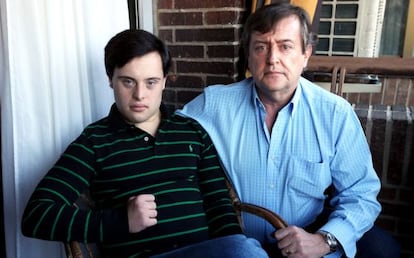How come I can’t vote?
Congress has agreed to lift restrictions on the electoral rights of the mentally disabled Almost 80,000 people have been excluded from the political process

In 2011, a judge decided that José Ignacio Ramírez Moreno, who had already voted in a number of elections, was no longer fit to take part in Spain’s electoral processes. Aged 28, Ramírez, suffers from what is termed mild intellectual incapacity.
The courts can only deprive somebody of their right to vote in Spain on two grounds: for having been convicted of a criminal offense and mental incapacity.
In October, Congress approved a motion to eliminate restrictions preventing the mentally disabled from voting that would bring Spain into line with the UN Convention on the Rights of Persons with Disabilities, approved by Madrid in 2008. The convention states that UN members must make sure that the disabled are able to participate in the political process, which means not only having the right to vote, but also to stand for political office (last June, Valladolid city council appointed a woman with Down’s syndrome, the first in the country, and one of only a few in Europe).
But as María José Alonso Parreño, a lawyer who specializes in the rights of people with disabilities, points out: “In practice, what tends to happen is that the courts establish what somebody cannot do, rather than what they are capable of.”
The bar is higher for disabled people than for the rest of the population”
And this despite the Spanish Constitution requiring the government to “respect the legal rights of the disabled,” says Gerardo Ruiz-Rico, a professor of Constitutional Law at the University of Jaén. “Denying somebody the right to vote should be an exception, and not the general rule, in the case of such people,” he adds.
More than 79,000 people have been deprived of their right to vote by the courts, 61 percent of whom are aged between 18 and 64. Carlos Ganzenmüller, a lawyer who works with the disabled, says he has called on state lawyers to prevent the automatic removal of people with mental disabilities from the electoral register, and to assess each case carefully.
Ruiz-Rico says that the denial of the right to vote “should always be assessed by a judge. Which is not the case: this happens almost automatically and without properly looking into the extent to which a person’s disability really affects their judgment.”
Ganzenmüller says it has become more common for people who have had their right to vote denied to appeal, as in the case of José Ignacio Ramírez.
It is the system that has the disability; it is unable to adapt to our individual needs”
“If we had been told that our son’s case was being reviewed, we would have told the judge that José had always taken part in elections,” Ramírez’s father says.
Jesús Díez Rodríguez, who has Down’s syndrome, also had his right to vote automatically removed after his parents registered him as disabled when he turned 18, two years ago. They say they did not understand that this would automatically disqualify him. “He is very independent: he travels on public transport alone, and manages small amounts of money,” says his lawyer.
When Díez Rodríguez met with a judge to assess his case, he made it clear that he wanted to be able to vote. But after a lengthy examination on the workings of government, the judge decided otherwise. The family appealed against the ruling, pointing out that their son had voted in the 2011 general election, while he was still on the electoral register. He has since had his right to vote restored.
“How is it possible that the bar is set higher for disabled people than for the rest of the population, who are not even required to show that they can read and write,” says Alonso.

“The disabled are required to show a level of understanding that the rest of the population isn’t,” agrees Ester Ortega Collado, the head of Fundación Tuya, which advises people with disabilities of their rights, and has appealed against court rulings depriving them of their right to vote. “It is the system that has the disability; it is unable to adapt to the needs of each of us as individuals,” she says.
Juan Antonio Doncel, a lecturer in Constitutional Law at the University of Extremadura, says that the two biggest problems that must be addressed are whether the disabled are able to understand who they are voting for, and if they are able to exercise their right to vote by “attending a polling station, choosing the right forms, identifying themselves, and so on.”
Ortega Collado rejects arguments that the mentally disabled are, for example, vulnerable to manipulation. “Voting is a right, and that is all there is to it.”
“How come I cannot vote now, if I have voted in the past?” asked Rodríguez when told by his parents that the courts had denied him this right. Ganzenmüller says that one way to overcome the courts’ tendency to assume that the mentally disabled have no understanding of the political process is by adopting a system of “gradual supervision that can be periodically reviewed,” citing the example of the Catalan province of Lleida, where some people with Down’s syndrome are assigned an assistant who helps them play a bigger role in society.
Doncel accepts the difficulty of what he calls, “defining the difficulties that influence somebody’s ability to vote,” at the same time as calling for the need to, “break down the formalities that prevent people from exercising that right.”
In 2011, the previous Socialist Party administration passed a law adapting the UN Convention on the Rights of Persons with Disabilities, setting a 12-month timeframe to modify the disqualification process, effectively requiring the courts to work on a case-by-case basis.
In October of that year, the UN committee overseeing implementation of the convention expressed its concern that depriving people of their right to vote was “the rule, and not the exception” in Spain. Following the motion passed by Congress in November, Spain’s courts have been given six months to implement reform. A spokesman for the Justice Ministry says that it is now working with the secretary of state for social services and that “every effort will be made to attend to the demands of representatives of said collective.”
Tu suscripción se está usando en otro dispositivo
¿Quieres añadir otro usuario a tu suscripción?
Si continúas leyendo en este dispositivo, no se podrá leer en el otro.
FlechaTu suscripción se está usando en otro dispositivo y solo puedes acceder a EL PAÍS desde un dispositivo a la vez.
Si quieres compartir tu cuenta, cambia tu suscripción a la modalidad Premium, así podrás añadir otro usuario. Cada uno accederá con su propia cuenta de email, lo que os permitirá personalizar vuestra experiencia en EL PAÍS.
¿Tienes una suscripción de empresa? Accede aquí para contratar más cuentas.
En el caso de no saber quién está usando tu cuenta, te recomendamos cambiar tu contraseña aquí.
Si decides continuar compartiendo tu cuenta, este mensaje se mostrará en tu dispositivo y en el de la otra persona que está usando tu cuenta de forma indefinida, afectando a tu experiencia de lectura. Puedes consultar aquí los términos y condiciones de la suscripción digital.








































